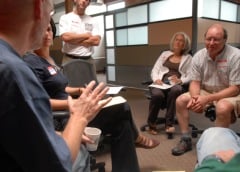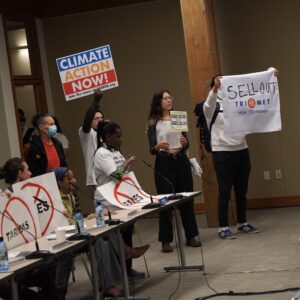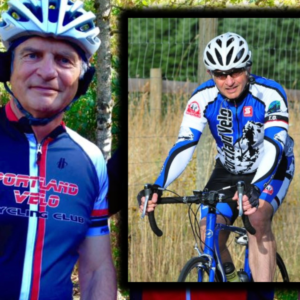
held in August.
(Photo © J. Maus)
Tonight from 5:30 to 7:30 in Northwest Portland, the Bicycle Transportation Alliance will hold the first of seven Member Forums.
The BTA says this members-only event will allow their staff and board to discuss the issues that are “relevant and important to your community.” At an Advocacy Forum event held last August, the BTA focused on bike safety.
“We’re opening up the discussion and asking members who attend to agree upon one or two topics they’d like to prioritize during the meeting… Prospective members who’d like to attend are encouraged to join at the door.”
— Margaux Mennesson, BTA communications coordinator
Attendees at that event watched a presentation by former Advocacy Manager Michelle Poyourow and then broke off into stations to discuss things like the Police Bureau’s role in bike safety and to give the BTA feedback on safety-related questions like, “Would you feel safer if there were more bicyclists, even if some were less skilled and orderly; or if there were fewer cyclists, but they were more skilled?” (A majority said the former.)
Tonight’s event will be different, says BTA Communications Coordinator Margaux Mennesson. “The structure of this forum will be a bit different… This time we’re opening up the discussion and asking members who attend to agree upon one or two topics they’d like to prioritize during the meeting.”
Topics suggested by the BTA include; feedback on their Executive Director search, how to increase “member engagement,” and their 2011 legislative agenda.
Mennesson says the BTA is always interested in hearing from non-members, but this event is members-only. “The priority at these meetings is to hear from people who support our advocacy work as a member…. prospective members who’d like to attend are encouraged to join at the door.”
RSVP to margaux@bta4bikes.org if plan to attend.
-
BTA Member Forum – Portland
February 25th, 5:30 – 7:30 pm
Whole Foods Market, Salud Community Room (1210 NW Couch Street)







Thanks for reading.
BikePortland has served this community with independent community journalism since 2005. We rely on subscriptions from readers like you to survive. Your financial support is vital in keeping this valuable resource alive and well.
Please subscribe today to strengthen and expand our work.
Portland has huge numbers of cyclists but the vast majority only ride in fair weather for commuting.
If the BTA could organize some workshops on riding in the rain and chilly Winter weather, we might be able to get a decent number of year-round cyclists who inspire more people to choose to ride.
Cycling in the rain is no problem if you are prepared. #1 thing for me is wiping down the chain with a rag after the ride to avoid rust.
Maybe a Winter version of the Bike Commute Challenge would help.
the real juice would be from FORMER members. C-
Some good potential topics:
1. Transparency, both by staff members and the board
2. Plans for advocacy in areas outside the inner core (Cully, e. of 205, SW Portland)
3. Columbia River Crossing – next steps?
4. ODOT – putting pressure on ODOT to ensure bicycle needs being met.
I’m in Michigan this week, so I can’t be there to bring them up myself, but any of those topics are good ones to discuss. Or whatever may be bothering YOU. Members, it’s your organization, steer the discussion!
If they really wanted to change, they’d have one of these events for former members.
It was an interesting discussion– one former member did attend, actually. He made himself heard, but I’m not sure how constructive his comments were or how the board members who oversaw the meeting will incorporate those dissenting opinions.
I think more than anything, the meeting was useful as a way to solicit additional opinions about how BTA can be most helpful to its membership, and to our community at large. Keeping the 2030 Bike Plan alive and moving forward was a major topic at the meeting, as was the BTA’s new focus moving forward. Building coalitions to get larger public support for safer streets is a big task — as cyclist-only advocates, the BTA would have limited impact outside Portland. It seems we won’t make progress until we can move beyond our “silos” of advocacy.
It sounds like there is one very desired candidate (not named) for the Executive Director position — they are hoping to wrap the recruitment up within three to four weeks.
MeghanH (#5) “It seems we won’t make progress until we can move beyond our ‘silos’ of advocacy”
Interesting – is that a personal observation, or something the BTA expressed at the meeting? I think that for topics like Complete Streets that’s exactly right, and I’m glad to hear that the BTA intends to coalition build.
Not all topics are that conducive to coalition building, however, especially those in where the needs of one group conflict with the needs of another – and of course any issue putting an organization like CCC, the BTA, WPC, CLF or Umbrella at odds with its source of funding cannot be served by that organization, or by any coalition led by that organization. There’s definitely still room for other groups. Especially lacking in Portland is a litigating group to hold individuals and entities accountable when they fail to adhere to the law. The BTA once fulfilled that role, but it’s looking increasingly like a new group will be needed in order to fill that niche.
That “silos” comment was said in different ways by several folks who attended, including BTA board members and staff. It seems that is a major priority for them going forward.
It was particularly true when we were talking about the 2030 Bike Plan, although I think that will be a tough sell for some folks. There’s little in the Bike Plan that would entice pedestrian or transit advocates to put forth the effort to advocate it should get built. But it seems the BTA wants to make an effort to reach out to lots of folks (health experts, freight interests, etc) to help move major efforts along.
I think that’s smart of them – the BTA will need freight to help get some of this built, and freight interests have typically been a major impediment to due to perceived conflicts in goals.
The BTA’s strength in the past 3-5 years has been coalition building, and I think they’ve been very successful in that vein. I hope they keep it up.
I’m that former BTA member that MeganH @5 mentioned.
(This posting a little long; sorry.)
Mary Roberts chaired the meeting. Mary’s and the other BTA board and staff who were in the room said that in order to get the $600 million 2030 Bike Plan built that they would need to form alliances with other groups, such as transit and pedestrian advocates or health care providers. The thought was that bicyclists by themselves had insufficient clout to get $600 million allocated to bicycle spending. Those other groups could help in an effort to get “active transportation” funded. Pedestrians would help because often facilities that benefit bicyclists also benefit pedestrians. Health professionals like it when people are healthy, so they would help by endorsing funding proposals which involved active transportation. Mary said that they formed this opinion during meetings that they held to discuss the bike plan.
Mary repeated the thought that I’ve heard said by the BTA and the city of Portland, that to get a 25% bicycle ride share would require building more facilities that riders feel safe on.
I tried to make the point that the BTA should look after the needs of its existing membership, who are riding bicycles now. I tried to make the point that there’s a lot more work that needs to be done on the West side. I questioned whether bicyclists are getting our fair share of funding now, given how many we are, how many trips we make, and how much of the actual funding we get versus what we contribute in property and income taxes. Mary and the others thought this wouldn’t work; we don’t have enough clout.
One lady in the audience who was a pedestrian advocate suggested the bicycle registration idea, saying that with a bike registration fee then bicycles could argue that they are paying for facilities. Many in the audience, myself included, quickly objected to this because it would mean bicycle facilities would then be limited to whatever is raised by that registration system. Someone else pointed out that the DMV couldn’t figure out a registration mechanism that would generate more money than it would cost.
Someone mentioned Rep. Krieger, but not by name. In response I suggested that the BTA needs to form a PAC which isn’t limited by 501(c)(3) rules. For example, a PAC that could make political contributions to whoever is running against Rep. Krieger. Krieger, you may recall, proposed a bicycle registration bill in the 2009 Legislative session. One of the other attendees (Steph?) suggested that I look into the Bike/Walk/Vote coalition. Mary said that the BTA doesn’t have enough money to form a PAC. (I didn’t get a chance to ask, “how much money is that?”)
To whatever I said, Mary said something like “that’s a good point.” But I don’t think that I changed her mind.
Mary also said that the BTA was taking a lot of time getting a new IT infrastructure and a better accounting system. (I’m a software engineer and my wife has a degree in accounting. You’d think I’d find that bit of news fascinating. But my reaction was, so what?)
More “safe feeling” facilities means more MUPs where I’m faced with pedestrians wlaking 3 across, dog walkers with the dog on one of the leashes on a spool, and sight distances designed for an 8 mph top speed, like what I see on the Fanno Creek trail on the west side. It means more cycle tracks, where I have difficulties making turns, and other problems being a vehicle. I’ve seen this type of grade separated facility constructed since the 1970s. Look at the one-side of the street paths on Garden Home Road west of Oleson, or on SW Farmington near 185th. The goal then as now is to get that same concerned but scared demographic out of their cars and onto bicycles. It didn’t work then, and I don’t think it will work now. There will never be sufficient funds available to build enough overpasses so that you can ride your bike from here to there without having to cross a street or ride with the scary cars. And even if there were enough money, it would still get dark and it might rain, so that demographic will still take their cars anyway.
I think that the BTA is going to go in a direction that doesn’t help me:
* they aren’t focused enough on improving things for those of us on the west side. I know of the BTC, but they seem primarily interested in operating a community cycling center, just located in Washington County instead of Portland.
* the BTA thinks they can form a coalition with other groups in order to get bicycle funding. I don’t think that’s going to work. Look, for example, at one walking advocate’s response to the other posting Jonathan had on the tragic death of the 93 year old on 39th/Cesar Chavez. ecohuman@9 on that thread says, “Imagine: pedestrian access being more important than bicycle access. No bicycles or motorized vehicles on sidewalks, walking trails, or crosswalks.” At least some of the walking advocates don’t like bicycles that much.
* too much emphasis on grade separated paths
* too willing to get along rather than to litigate something, as matt picio @6 mentions. For example, remember that “walk your bikes” sign at RiverPlace appeared? The BTA should have gotten a court injunction to get that sign taken down, right away.
* too willing to allow Tri-met to build more rail. Even Pedestrian Advocate Lady at the 2/25 Forum said that rail and bicycles don’t mix well with each other. Jonathan quoted the author of the OHSU study on bicycle injuries: “’One finding I thought was interesting,’ said Hoffman, ‘is that poor roadway surface conditions played a role in 20% of the traumatic events — gravel on the road, rail tracks on the road, steel plates in the road, and so on… led to these events.’” If it were up to me, the BTA would oppose any additional rail based transit. It’s too expensive and it’s dangerous to bicycles. Regular busses, or trolley busses, are OK with me. But no more rail.
* staff turnover means that they are spending their time hiring staff and not getting things done. Mary again did not answer questions about Bricker at the Forum.
I left the Forum before it ended. I didn’t renew my BTA membership.
matt picio @6 above raised the question of another group. That’s been mentioned previously. Is it time to form another group? I don’t know.
Thinking aloud, what could be different and better about a new group? A new group could:
* Focus on the needs of people who are bicycling, now. It could lobby for fixing crash corner (aka Oleson/Beaverton-Hillsdale/Scholls;) putting bike lanes on Garden Home Road; filling in the gaps on the Barbur Blvd. bike lanes; prohibiting large aggregate chip seal; bringing storm drains up to grade level, rather than 2 inches below, in Hillsdale; sweeping the streets more often; rather than lobbying for more MUPs.
* Be a PAC rather than a 501(c)(3). So it could make political contributions and do endorsements.
* Be more willing to litigate a problem.
* Decide whether it wants to be Portland only or state-wide. If it is state-wide, then it should have a structure to allow local chapters.
* More input on direction of the organization from the membership. Less “Here’s the direction we are going, you can come along if you want,” and more “which way do you think we should go?” The membership would nominate and elect the board of the new group. (One idea I had was each member got the number of votes in each election based on how many miles they rode last year. But, I have not figured out how to avoid cheating.)
What could be different, and worse, about a new group:
* Maybe Mary is right in that it does take a lot of money (say, more than a few thousand dollars) to form a PAC, or that the yearly maintenance of a PAC is too expensive.
* Ever see Monty Python’s Life of Brian? Remember all the little ineffective resistance groups who hated each other more than they hated the Romans? (A mis-quote from the movie: “Whatever happened to the Popular Front?” “Oh, him? He’s over there. Splitter!”) I don’t want bicycle advocacy around here split into a bunch of ineffective little groups who hate each other, where each group’s primary purpose is to show up at government hearings and speak against the other groups’ proposals.
i agree the BTA is too aligned with the facilities thinking, and that especially if they will not even consider the 501(c)(4) route then somebody else needs to step forward. but there may also something to be said for getting engaged in committee work and running for the board on a vehicular cycling platform.